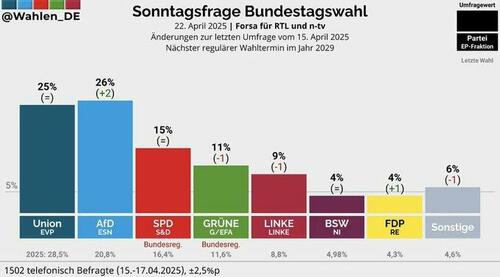Probably just a coincidence…
Just days after Germany’s ‘Alternative fur Deutschland’ (AfD) party topped the polls…
Germany’s domestic intelligence agency has formally classified the party as a right-wing extremist movement, granting authorities enhanced powers to monitor the party as a potential threat to democracy, due to the “extremist character of the entire party.”
As Reuters reports, the BfV agency’s finding, based on a 1,100-page expert report, that the AfD is racist and anti-Muslim allows the authorities to increase surveillance of the party, including by recruiting confidential informants and intercepting communications.
“Key to our assessment is the AfD’s ethnic-based understanding of the people, which devalues entire population groups in Germany and violates their human dignity,” they added.
“This is reflected in the party’s overall anti-immigrant and anti-Muslim stance.”
The AfD has “defamed and vilified” individuals and groups, stirring up “irrational fears and hostility toward them,” it added.
Here’s the image that Reuters chose to run alongside this story…
As Remix News reports, one of the key factors that the BfV is attempting to use to justify the designation is the AfD’s alleged position on “ethnic Germans.”
“The ethnic-descendant understanding of the people prevailing in the party is not compatible with the free democratic basic order,” reads the statement from the BfV.
“The AfD, for example, does not consider German citizens with a migration history from predominantly Muslim countries to be equal members of the German people, as ethnically defined by the party.”
The BfV, which has been led by a Christian Democrat for years who was rabidly opposed to the AfD, a rival party, further writes:
“The BfV reached this conclusion after an intensive and comprehensive expert review. Following its statutory mandate, the BfV was required to assess the party’s actions against the central fundamental principles of the constitution: human dignity, the principle of democracy, and the rule of law. In doing so, in addition to the federal party’s platform and statements, the statements and other behavior of its representatives, as well as their connections to right-wing extremist actors and groups, were examined in particular.”
The BfV is no longer led by Thomas Haldenwang (CDU), but here he is discussing the AfD during his tenure. Haldenwang gave up his position to run as an MP but he lost his seat.
🇩🇪❌Will Germany’s AfD party be banned?@Dieter_Stein, the editor-in-chief of @Junge_Freiheit, discusses how the German establishment’s strategy is designed to create a toxic atmosphere around the anti-immigration AfD party, with Stein describing it as a “war of attrition.” pic.twitter.com/KV54nHKl57
— Remix News & Views (@RMXnews) May 6, 2024
In the party’s first response to the report, the leader of a regional parliamentary group, Anton Baron, said:
“It is sad to see the state of democracy in our country when the established parties now resort to the most politically questionable means to act against the strongest opposition party.”
The outgoing Interior Minister Nancy Faeser has called the assessment “clear and unambiguous” and insisted that the agency operates independently,
“There was no political influence whatsoever on the new report,” she added.
“The new assessment will certainly be subject to judicial review as well. In a constitutional state, independent courts ultimately make the decisions.”
The AfD has denounced the move as a “severe blow to German democracy” and vowed that the party “will continue to defend itself legally against these defamatory statements.”
“The AfD, as an opposition party, is being publicly discredited and criminalized shortly before the change of government,” AfD co-leaders Alice Weidel and Tino Chrupalla said in a joint statement.
“The associated, targeted interference in the democratic decision-making process is therefore clearly politically motivated.”
The classification could reignite attempts to get the AfD banned, but Germany’s outgoing chancellor Olaf Scholz, whose Social Democrats will be the junior partner in Merz’s new coalition, advised against rushing to outlaw the AfD.
“I am against a quick shot, we have to evaluate the classification carefully,” he said on Friday at a church convention in the northern city of Hanover.
Additionally, the intelligence decision comes days before conservative leader Friedrich Merz is due to be sworn in as Germany’s new chancellor and amid a heated debate within his party over how to deal with the AfD in the new parliament.
Previous attempts to ban the far-right NPD, which took some notably extremist stances, were unsuccessful, with the top court arguing that the party was not large enough to represent a serious threat to the democratic order.
There were also questions about the excessive number of informants, making it difficult to ascertain how much of the extremism in the party was due to informants versus the party’s own members.
Loading…




















